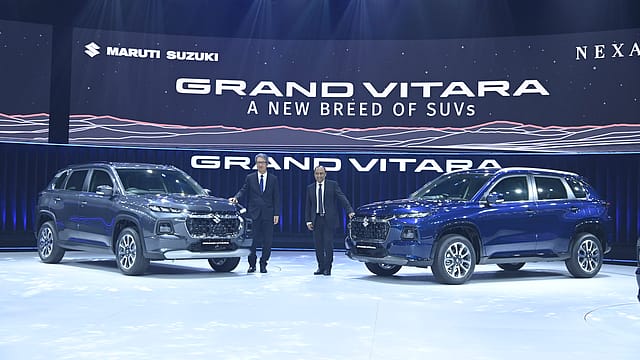Grand Vitara's success to bring hybrid in more models: Maruti's Takeuchi
ADVERTISEMENT

The Indian government will bring in measures to incentivise the manufacturing of passenger vehicles that use green technologies other than battery-powered, pure electric vehicles, says Hisashi Takeuchi, the MD, and CEO of Maruti Suzuki India Limited. "The support lent by the government to EVs is good. It is giving the push EV markets in India need to grow. That is a step in the right direction; However, I feel the government will support other decarbonising technologies as well, as long as it's good and contribute to a better India," Takeuchi says in a conversation with Fortune India.
Speaking on the launch of the Grand Vitara, Maruti Suzuki's flagship and first strong hybrid offering, Takeuchi believes that it is the beginning of the country's largest maker of passenger vehicles towards realising the vision of carbon neutrality in tailpipe emissions. "Grand Vitara will accelerate mass electrification and realisation of a carbon neutral society in India. Maruti Suzuki plans to bring multiple technologies in its journey to decarbonisation like CNG, flex fuel, strong hybrid, and EV," he explains, reiterating a drivetrain-agnostic approach that the company is going to take.
Currently, hybrid cars in India are taxed as high as 43%, whereas according to the latest revised GST rates, a GST of 5% is levied on electric vehicles, whether fitted with a battery pack or not. Even though the FAME India scheme includes measures to adopt hybrid vehicles, electric vehicles have been the mainstay of the Indian government's efforts to curtail tailpipe emissions and move towards decarbonisation. However, Takeuchi is of the view that the electrification process in India, or leapfrogging into electric vehicles cannot happen overnight. "Currently, EVs have a penetration rate of 5%, maybe next year it will be 6%. By 2025, it could be 10-15%," he avers. This means that the rest will be non-EVs, and according to Takeuchi, the target should be to make these vehicles more environment-friendly. Even though the company will unveil its first electric vehicle in 2025, MSIL will not be fixated just on an electric powertrain. "If the Grand Vitara is a runaway success, then we will look at introducing a strong hybrid powertrain in more of our models," Takeuchi adds.
Concurrently, Shashank Srivastava, senior executive director, marketing and sales, MSIL, believes that the ecosystem in India is not ready for mass adoption of electric passenger vehicles. "Passenger EVs in India currently face two big barriers—the cost of acquisition, which depends on the cost of batteries, and secondly is charging infrastructure, and not only the availability of chargers, but the speed at which the vehicles can be charged," Srivastava tells Fortune India. Maruti currently is the leader in CNG-powered vehicles, and according to Srivastava, has cornered an 80% market share in the CNG passenger vehicle segment—with nine out of 15 vehicles in our portfolio powered by a CNG drivetrain. "CNG has a lower running cost vis-à-vis petrol. Currently, we have an order backlog of 125,000 vehicles, and our priority is to serve those customers first. Once the supply chain improves, and we have enough production capacity, then we can look at introducing more models in CNG," he adds.
Takeuchi also says that a mid-size SUV product, with a hybrid powertrain, is an expensive proposition for a market like India. "But people are still buying, the top-grade, high-end vehicles. So, the market has evolved completely from what it earlier used to be. The environment around us is changing, and we're taking up this challenge at a good time," he explains. Takeuchi is hopeful that with the launch of the Grand Vitara, the carmaker will be able to jockey back the share of 50% in the passenger vehicle market, which stood at 41.03% in June 2022, according to figures released by the Federation of Automobile Dealers Association (FADA).
Srivastava says that MSIL ascertained that it was the mid-size SUV where India's premier automaker has lost ground and is foraying into the segment. "This does not mean that we're moving away from the small-car market; we're following where car buyers and the market are moving. We still have a 70% market share in hatchbacks, in a market which is shy of 12 lakh cars last year," he clarifies.